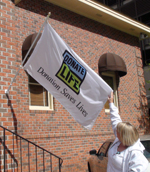|
by Mary Helen Yarborough
Public Relations
Lifted by gentle breezes, the new white Donate Life banner unfurls, revealing its message urging the ultimate gift.
As part of a nationwide campaign to honor organ donors and their
families, the flag will be displayed daily through this month in front
of the Transplant Center administration building on Ashley Avenue.
After April 30, it will be erected each time someone who is authorized
commits for the donation of organs, tissue and marrow of a deceased
inpatient.
 Sara
Stello straightens out a part of the new flag. Starting in May, the
flag will be erected each time a loved one commits for the donation of
organs, tissue and marrow of a deceased inpatient. Sara
Stello straightens out a part of the new flag. Starting in May, the
flag will be erected each time a loved one commits for the donation of
organs, tissue and marrow of a deceased inpatient.
“When the family makes
that decision, we will raise the flag in honor of them,” said Sara
Stello, transplant program coordinator.
All of the hospitals that harvest organs for donation also will raise a
flag in a donor family’s honor, including Roper St. Francis. “We have a
little friendly competition going on with them,” Stello said. Other
participating hospitals include Palmetto Health System hospitals in
Columbia, and the Greenville Hospital System.
The flag program launch coincides with National Donate Life Month.
Recommit your donation
Any adult desiring to be an organ donator must register their desire with the Department of Motor Vehicles (DMV).
The registration requirement stems from the S.C. Organ and Tissue Donor
Registry established in January. Everyone who desires to be an organ
donor must register a legal consent to be a donor, even if that consent
was made prior, at the DMV or through the confidential, secure donor
registry at http://www.Every11Minutes.org. (Information from the DMV will not automatically be transferred to this registry from previous consent.)
By affirming a desire to be an organ donor, part of our bodies will be
made available for lifesaving transplants, therapies and medical
research. Recommitting a desire to become an organ donator would help
later avoid conflicts and the pressure on loved ones.
Since the Every 11 Minutes Campaign was launched, donation commitments
have grown by nearly 72,000 statewide, including 170 from the MUSC
campus alone.
The Web address relates to a fact that every 11 minutes, another person
in this country is added to the transplant waiting list; but many will
die while waiting to receive an organ transplant.
Organ donation and transplantation began in the United States nearly 55 years ago, and more than 30 years ago at MUSC.
In 2008, more than 14,198 people were organ donors, according to the
National Institutes of Health (NIH), which estimates that more than
200,000 people are alive today because of organ donation.
Still, more than 101,000 people are on the waiting list for an organ
transplant. Thousands more need tissue and corneal transplants each
year, and about 30,000 people a year are diagnosed with blood diseases
that could be cured by a marrow/blood stem cell transplant.
NIH advises that donors inform families and friends of their decision.
Threat to South Carolina organ supply
MUSC transplant program officials and clinicians are opposing a measure
that could send organs harvested here out-of-state even when a South
Carolinian has been on a waiting list for that particular organ.
The measure proposed by the United Network for Organ Sharing (UNOS)
appears to reward states without the same level of commitment and
generosity as South Carolina.
The proposed change would require livers recovered locally to be
distributed among all recipients in the region, even if a local
recipient is available. The proposal is slated for a vote by the UNOS
board as early as late June. UNOS, which is an agency overseen by the
U.S. Department of Health and Human Services, will receive comments
until 5 p.m. April 24.
“The Medical University of South Carolina Transplant Center believes
that this proposal, if approved, could have a negative impact on all
patients who are waiting on the list for a Liver Transplant as the
proposed changes will require patients to be sicker in order to receive
priority within the region,” said a letter from Kim Phillips, R.N.,
transplant program administrator; and Prabhakar Baliga, M.D.,
transplant program medical director. “We believe this proposal could
reduce the number of livers available for transplant in patients listed
at MUSC by 20 percent to 30 percent.”
Baliga and Phillips said the implication of the UNOS proposal would:
- Lower post-transplant survival because of lost wait-list priority;
- Reduced quality of organs offered for transplant to patients in South Carolina;
- Increased cost of
transplant and organ recovery expense due to increase travel distance
between donor hospital and transplant center;
- Decreased access to
transplants; particularly minority access to transplants for patients
living in such states as South Carolina.
- Reduced community support for donation.
For those interested in
participating in the letter- writing campaign to South Carolina's
congressional representatives regarding this matter, e-mail
phillk@musc.edu.
Comments may be made to UNOS, visit http://unos.org/policiesAndBylaws/publicComment/submitYourComment.asp?PropID=262.
Friday, April 24, 2009
|



